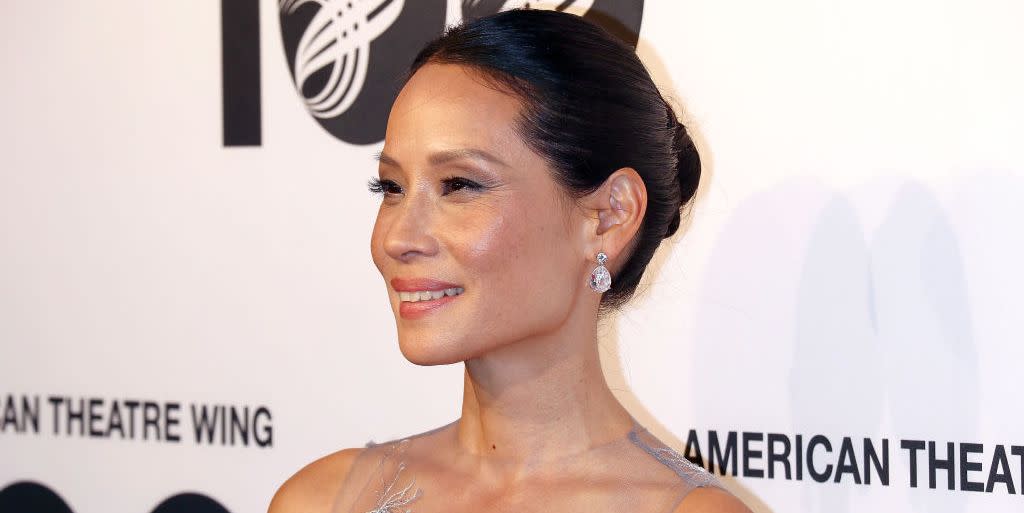Lucy Liu Says People “Weren’t Willing to Take a Chance” on Her When She Entered Hollywood

Whether she was playing the sharp and commanding Ling Woo in Ally McBeal, the magnetic ass-kicking spy as Alex in Charlie's Angels, or the meticulous and bold Watson in Elementary, it's hard to imagine Hollywood without Lucy Liu. But when Liu moved out to southern California after graduating college to pursue a career in acting, she found it hard to convince decision makers that she belonged on screen.
"A lot of people were unwilling to even take me in for representation because they didn't feel there was enough out there for me to even go out on auditions for," Liu tells Woman's Day. Because no one was willing to take her on as a client, she freelanced with various agents in the hopes she could get her face out there. "At the time, I was just looking for an opportunity to show what I could do, to show my talents," Liu says. "I wasn't able to even get an audition or get in the door."
Liu is looking back on her career as part of the Jane Walker by Johnnie Walker First Women campaign, which features a group of boundary breaking women who had major accomplishments in their fields and led the way for other women. Liu was just the second Asian American woman to receive a star on the Hollywood Walk of Fame, and in 2000 became the first Asian American woman to host Saturday Night Live.
Though Liu could barely secure an agent when she first entered Hollywood, she says she started noticing a shift when she was cast on the TV show Ally McBeal. Her character, Ling Woo, was a blunt, strong, brilliant lawyer with a commanding presence. Though the strong archetype of a kind of woman rarely shown on television, Liu says that her Chinese American identity led many people to stereotype Woo and put her in a box.
"People would criticize the role of Ling Woo as somebody who was considered stereotypical because she was strong and had an opinion," Liu says. "So they would label her a Dragon Lady, and I didn't even know what a Dragon Lady was — I had to look it up." Liu says she never saw Woo fitting the "Dragon Lady" stereotype, but rather that she was simply a character who was ultra honest and blunt. "They needed to find some kind of Asian stereotype to categorize her as, and I felt that was very disheartening," Liu says.
When Liu was cast in Charlie's Angels, she says she was able to side-step the over-imposed stereotypes that were often cast on her characters. "When Charlie's Angels came into play, that broke the ceiling of what Americana was," Liu says. "Because Charlie's Angels is considered something that was based in Americana, so that was the crack which then led to the destruction of that ceiling for me." After Charlie's Angels, Liu began getting offers for more films, many of which were action movies.
Though Liu knows that many of the roles she's known for from her Charlie's Angels character to her Kill Bill assassin O-Ren Ishii, it was never her intention to become an action star. "I was in the business to act, not necessarily to run around and kick ass," she laughs. In fact, some of her favorite roles were ones in which she could play a "normal" woman — not necessarily someone with a traumatic past or a penchant for swordplay. She points to her roles as a love interest in Lucky Number Slevin and Watching the Detectives as times she got to try something new and do something unexpected of her.
"I learned so much because there was a freedom in those roles," Liu says. "It wasn't me suddenly breaking out and running up the ceiling and doing anything more than just be that girl, and I think that that was really special." Liu also recalls asking the writers not to change the name of her characters after she was cast. "In the script description it says for the character, 'Lindsey bounces in, this bouncy blonde, very perky etc.,' and I liked that we kept those things in without changing it because it was like this is a very different expectation, but I don't think you ever look back because that's who that person is now and that's who that person is on celluloid."
When she looks at how the entertainment industry has evolved since she entered it a few decades ago, Liu is hopeful about the way things have changed. "I'm so happy to see so much more diversity," she says. "And I still think there's a long way to go." Still, she's glad to see increased representation of various races, genders, and identities, and a growing shift in accepting the undeniable truth that more "representation is needed."
While she was chipping away at the glass ceiling in her early days in Hollywood, Liu picked up a few skills that have lasted her entire career, one of which was picking up the phone. "I think people a lot of times are waiting for incoming calls," she says. "One thing I've learned from my team and my career is you have to be willing to make outgoing calls; you can't just wait for the phone to ring."
And if you're lucky, when it does ring, you can answer, "Good morning, Charlie," just like Liu.
Want more Woman’s Day? Subscribe to Woman's Day today and get 73% off your first 12 issues. And while you’re at it, sign up for our FREE newsletter for even more of the Woman's Day content you want.
You Might Also Like
